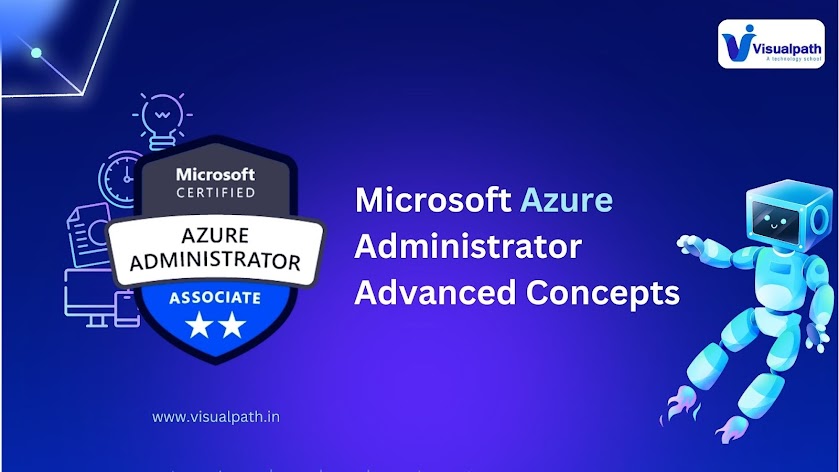- Get link
- X
- Other Apps
- Get link
- X
- Other Apps
The Microsoft Azure Administrator Advanced Concepts?
Microsoft Azure Administrator Advanced Concepts encompass various
areas critical to the efficient management, security, and optimisation of Azure
environments.
Here are the key advanced concepts Azure
administrators should master:
Advanced Networking
1. Virtual Network (VNet) Peering: Facilitates seamless connectivity
between VNets, allowing resources to communicate across different regions with
minimal latency. Microsoft
Azure Administrator Training
2. Azure Load Balancer: Distributes incoming network
traffic across multiple VMs, ensuring high availability and reliability.
3. Application Gateway: A layer 7 load balancer with Web
Application Firewall (WAF), SSL termination, and advanced routing features.
4. Network Security Groups (NSGs): Control inbound and outbound
traffic to Azure resources, providing a layer of security.
5. Azure Firewall: Provides centralized network
security with built-in high availability and scalability.
6. VPN Gateway and ExpressRoute: Secure, high-performance
connectivity solutions for hybrid networking.
Identity and Access Management (IAM)
1. Azure Active Directory (AAD): Manages users and groups, provides
secure access to applications and resources, and integrates with on-premises
directories.
2. Multi-Factor Authentication (MFA): Enhances security by requiring
multiple forms of verification.
3. Role-Based Access Control (RBAC): Assigns specific permissions to
users, groups, and applications, ensuring the principle of least privilege.
4. Managed Identities: Automatically manages identities
for applications, simplifying the management of credentials.
Advanced Storage Solutions
1. Azure Storage Types: Blob Storage, Disk Storage, File
Storage, and Table Storage, each optimized for different use cases. Azure
Admin Training in Hyderabad
2. Data Replication: Ensures data durability and high
availability through replication options like LRS, GRS, RA-GRS, and ZRS.
3. Azure Blob Storage: Scalable object storage for
unstructured data with tiered access (Hot, Cool, Archive).
4. Azure Files: Fully managed file shares
accessible via SMB protocol.
5. Azure Disk Encryption: Provides encryption for data at
rest using industry-standard algorithms.
Monitoring and Troubleshooting
1. Azure Monitor: Centralized service for collecting,
analyzing, and acting on telemetry from Azure and on-premises environments.
2. Log Analytics: Aggregates and analyzes log data
from various resources.
3. Application Insights: Monitors live applications,
providing deep insights and detecting performance issues.
4. Azure Service Health: Personalized alerts and guidance on
service issues affecting resources.
5. Network Watcher: Provides tools for monitoring,
diagnosing, and gaining insights into network performance.
Security and Compliance
1. Azure Security Center: Unified security management and
advanced threat protection for hybrid cloud workloads.
2. Azure Policy: Enforces organizational standards
and assesses compliance across Azure resources.
3. Azure Key Vault: Safeguards cryptographic keys and
secrets.
4. Security Baselines: Predefined security configurations
according to best practices. Microsoft
Azure Online Training
5. Threat Protection: Includes services like Azure Defender and Azure Sentinel for
detecting and responding to security threats.
Automation and Orchestration
1. Azure Automation: Automates repetitive tasks, such as
VM management and patching.
2. ARM Templates: JSON-based templates for defining
and deploying Azure resources consistently.
3. Azure DevOps: Provides CI/CD pipelines for
automating application development and deployment.
4. Logic Apps: Automates workflows and integrates
apps, data, and services across enterprises.
5. Azure Functions: Event-driven serverless compute
service for running small pieces of code in response to events.
Advanced Compute Solutions
1. Virtual Machine Scale Sets (VMSS): Automatically scales the number of
VMs based on demand.
2. Azure Kubernetes Service (AKS): Simplifies deploying, managing, and
scaling containerized applications using Kubernetes.
3. Azure App Service: A fully managed platform for
building, deploying, and scaling web apps.
4. Azure Batch: Manages large-scale parallel and
high-performance computing applications.
5. Azure Functions: Serverless compute service that
scales automatically to meet demand. Azure
Admin Online Training
Mastering these advanced concepts enables Azure
administrators to effectively manage complex environments, enhance security and
compliance, optimize performance, and automate routine tasks, leading to
improved efficiency and reliability in their Azure
deployments.
Visualpath
is the Best Software Online Training Institute in Hyderabad. Avail complete MS Azure Admin Online Training worldwide. You will get the best
course at an affordable cost.
Attend
Free Demo
Call on - +91-9989971070.
WhatsApp: https://www.whatsapp.com/catalog/919989971070
Visit
https://www.visualpath.in/windows-azure-online-training.html
AzureAdminOnlineTraining
AzureAdminTraininginHyderabad
MicrosoftAzureAdministratorTraining
MicrosoftAzureOnlineTraining
MicrosoftAzureTraininginAmeerpet
MicrosoftAzureTraininginHyderabad
- Get link
- X
- Other Apps

Comments
Post a Comment